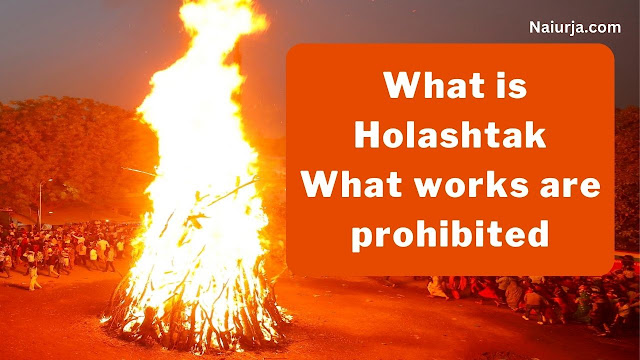Holashtak
Holashtak is a period of eight days that precedes the Hindu festival of Holi. It is considered an inauspicious period in which people avoid auspicious activities like weddings, engagements, or housewarming ceremonies. The word “Holashtak” is derived from two words: “Hola,” which is another name for Holi, and “Ashtak,” which means eight.
During Holashtak, people observe certain rituals and traditions. They perform puja (worship) and offer prayers to Lord Vishnu and Lord Krishna. Some people observe fasts during this period and avoid eating grains, beans, and certain vegetables. It is also a time for people to clean their homes and discard unnecessary items, symbolizing the removal of negativity and impurities from their lives.
The eighth day of Holashtak is known as “Holika Dahan,” which marks the beginning of the Holi festival. People light bonfires and offer prayers to Lord Vishnu and Lord Shiva, seeking their blessings and protection from evil forces. The next day is celebrated as Holi, also known as the “Festival of Colors,” where people throw colored powder and water at each other, dance, sing and exchange sweets and delicacies.
When is Holashtak
Holashtak is a period of 8 days observed before the Hindu festival of Holi. In 2023, Holashtak will begin on feb 27, 2023, and end on March 07, 2023. Holi will be celebrated on March 08, 2023. It is important to note that the dates of Holashtak may vary slightly depending on the lunar calendar and the region in which it is being observed.
Read more :- When is the date and time of Holika Dahan as well as know the worship method
How to get blessings of Lord Shiva on Mahashivratri
Holashtak beliefs
Holashtak is believed to be an inauspicious period in which people avoid auspicious activities and instead focus on purifying themselves both physically and spiritually. There are several beliefs associated with Holashtak, including:
Negative energies and impurities are at their peak during this period, and people must cleanse themselves to avoid any harm or misfortune.
Holashtak is associated with the mythological story of Holika, who was burnt in a pyre while trying to harm Prahlad, a devotee of Lord Vishnu. This story symbolizes the triumph of good over evil and the importance of seeking the blessings of Lord Vishnu.
It is believed that Lord Vishnu and Lord Krishna are more accessible during Holashtak, and therefore, people offer prayers and perform puja to seek their blessings and protection.
The eight days of Holashtak are associated with different aspects of nature, and people offer prayers and seek blessings from these deities. For example, the first day is associated with water, the second day with wood, the third day with earth, and so on.
Overall, Holashtak is considered a time for introspection, purification, and seeking the blessings of the divine. People observe various rituals and traditions during this period to ensure a prosperous and auspicious life ahead.
Which works are prohibited in Holashtak?
Holashtak is considered an inauspicious period in the Hindu calendar, and certain works and activities are prohibited during this time. The following are some of the works that are generally avoided during Holashtak:
Auspicious events :- It is considered inappropriate to conduct any auspicious events such as weddings, engagements, housewarming ceremonies, or any other ceremonies that involve starting new ventures or businesses.
Eating certain foods :- Some people avoid eating grains, beans, and certain vegetables during Holashtak. Instead, they eat simple food and fast for some or all of the eight days.
Cutting hair and nails :- It is believed that cutting hair and nails during Holashtak can bring negative energy and bad luck.
Traveling :- People avoid long-distance travel during this period as it is believed to increase the risk of accidents and other unfortunate incidents.
Purchasing new things :- People also avoid buying new clothes, jewelry, or other items during Holashtak, as it is believed that new things bought during this period can bring bad luck.
Starting new projects :- Starting any new projects or ventures during Holashtak is generally avoided as it is believed to bring bad luck and unfavorable outcomes.
Overall, Holashtak is a period of introspection, purification, and spiritual practice, and people avoid activities that may interfere with this objective or bring bad luck.
